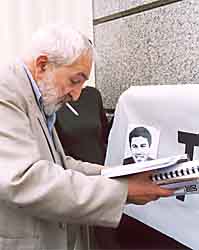Supreme Court Upholds Pasko Treason Sentence
Pasko case: all main charges were rejected but the verdict remains in force
 MOSCOW - In a major upset for environmental and human rights activists worldwide, Russia's Supreme
Court's military collegium June, 25 upheld a treason verdict against Vladivostok-based military
journalist and environmental whistle-blower Grigory Pasko.
MOSCOW - In a major upset for environmental and human rights activists worldwide, Russia's Supreme
Court's military collegium June, 25 upheld a treason verdict against Vladivostok-based military
journalist and environmental whistle-blower Grigory Pasko.
The appeal was Pasko's last chance to avoid the next four years in one of Russia's crumbling,
Soviet-era work camps for the crime of bringing to light the brewing nuclear disaster represented by
the Russian Navy's aging Pacific Fleet and its negligent waste disposal practices.
Human right activists and some 70 journalists were evacuated from the courtroom.
Pasko, who is jailed in Vladivostok, was not present for the hearing on the decision of his three
lawyers because of the long train journey his attendance would have entailed.
 "We can see now that military court is not able to hold an unbiased verdict - said Alexey Simonov,
President of Glasnost Defense Foundation. - Russia became now much farther from the real democracy
than it was three years ago".
"We can see now that military court is not able to hold an unbiased verdict - said Alexey Simonov,
President of Glasnost Defense Foundation. - Russia became now much farther from the real democracy
than it was three years ago".
Appeal denied
The court upheld the original Vladivostok verdict, but changed some of the wording. According to
Pasko's defense lawyers, the judges plan to introduce two changes to the Dec. 25 verdict, which will
presumably make Pasco's violation of two no longer legally enforceable defense decrees moot -
although Pasko will have to serve the four years all the same.
Lawyers said the court excluded from the verdict a reference to Pasco's having illegally attended a
meeting on Pacific Fleet exercises in September 1997, and also excluded a mention of the reporter's
maintaining contacts with foreigners.
Both of these exclusions come presumably as a result of a Supreme Court decision in May to overturn
Defense Ministry Decree No. 10, which barred military personnel from fraternizing with foreigners.
Defense Ministry decree No. 55 - which was a broad vague list of items considered to be state
secrets - was also declared by the Supreme Court not to have the force of law, and thus not a legal
foundation for prosecution.
"The court considers this a legal decision and the changes [being made to the verdict] are simply
cosmetic and will not lead to any legal consequences," said Reznik, Pasko's lawyer. He added that,
statistically, acquittals are rare in Russia.
The original verdict
On Dec. 25, 2001 Pasko, a military reporter for the Boyevaya Vakhta newspaper, was convicted of
treason in a Pacific Fleet military court and sentenced to four years in prison for attending a
meeting of naval brass and possessing notes he made there - which, according to the new "cosmetic"
changes in the verdict, will no longer be included in the conviction.
The Federal Security Service, or FSB, maintained that Pasko had intended to pass this information,
which allegedly concerned "secret naval manoeuvres," to the Japanese media -- though he was never
accused of actually having done so. He was, in other words, convicted for allegedly harboring the
notion of giving these notes to the Japanese.
Lost tapes and extended sentences
According to Pasko's lawyers, however, simply upholding the current sentence was not the military
prosecutor's goal. In fact, he wanted to add time to Pasko's sentence.
Part of the original conviction, Pavlov said, hinged on a number of Federal Security Service, or
FSB, tapes in which Pasko is allegedly conspiring to pass secret information to his Japanese
counterparts. The taping was fraught with legal violations and, furthermore, many of the original
FSB recordings were lost, forcing the defence to rely on written transcripts.
"But the prosecutor told the judges it was fine for us to work with violations," said Pavlov. "'If
the protocol is falsified,' said the prosecutor 'that doesn't mean the whole thing is falsified,"
Pavlov fumed.
"[On the tape] there are fragments about military exercises, and the [FSB] is trying to guess there
is something more," Pavlov continued. "But by doing that they actually make our case stronger."
Murashkin refuses to comment on any of the day's proceedings.
Next steps
Bellona and other environmental and human rights groups Tuesday vowed to take the case to the
European Human Rights Court in Strasbourg, but even that, according to Bellona's Jon Gauslaa, is
cold comfort.
As for Pasko, despite his incarceration, he is to edit a journal on ecology and law that will
publish five issues this year.
For more information:
ecopravo@ecopravo.info
ecrs@mail.wplus.net
Also you can send your messages of support for Grigory to these e-mail addresses.
Back to Pasko page